Finance Bill 2024: Senate proposes slashing indirect taxes by 50%, halt GST hike
Upper House proposes raising minimum wage to Rs45,000, providing extra allowance for persons with disabilities
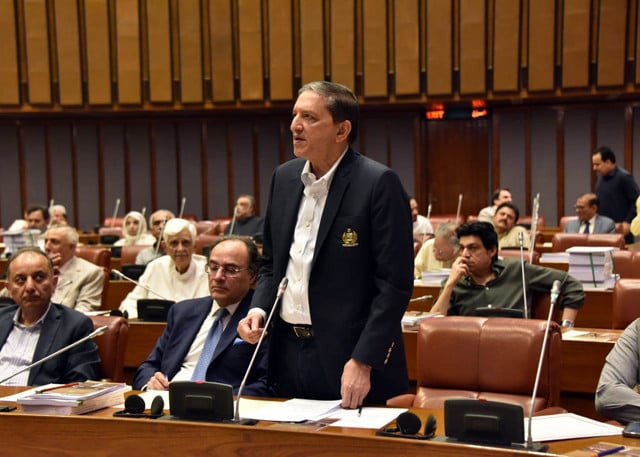
The Senate proposed a total of 128 recommendations, including nine concerning the Public Sector Development Programme (PSDP) for the year 2024-25, to the National Assembly for inclusion in the Finance Bill 2024 during a session on Monday.
These recommendations will be forwarded to the National Assembly, which will decide whether or not to incorporate them into the Finance Bill.
Of the total recommendations, 69 were general recommendations on the budget for 2024-25. Additionally, eight pertained to the Customs Act, 1969; 23 to the Sales Tax Act, 1990; 15 to the Income Tax Ordinance, 2001; three to the Federal Excise Act, 2005; and one to Abandoned Properties.
Chairman of the Senate Standing Committee on Finance, Saleem Mandviwala, presented the Senate’s budget recommendations, which were adopted by the House.
Earlier, speaking on the floor of the House, Mandviwala stated that they were given six days instead of the usual 14 to review the budget document and prepare recommendations for the lower house of parliament.
He mentioned that 32 associations and chambers of commerce from all provinces, along with members of civil society, including representatives from education, medical, retail, and automotive sectors, met with the finance committee to provide their feedback.
Read: Budget 2024-25: Govt raises income tax rates for salaried individuals
The chairman noted that out of the total Rs18.9 trillion budget, approximately Rs9.75 trillion would be allocated for interest and debt repayments, with Rs2.63 trillion needed to cover the budget deficit.
He criticised the authorities for not bringing 2.9 million non-filers into the tax net to increase revenue, instead of burdening the poor.
The committee unanimously rejected the increased tax on the lower-tier salaried class and the tax imposed on baby milk.
Mandviwala highlighted that, for the first time, persons with disabilities who served in public departments presented their grievances, stating they had been ignored in previous budgets. The committee proposed allocating a special allowance for them and addressing their concerns.
He also called for incentives for charity hospitals and taxation for those charging fees. He further expressed concern over new taxes on school children's books and stationery items, supporting public and stakeholder demands to abolish these taxes.
The chairman urged all political parties to avoid politicising Pakistan’s economy, warning that continued politicisation could lead to a worse budget next year. He advocated for a genuine charter of the economy, similar to the Charter of Democracy, to protect the economy from derailment.
The Upper House recommended raising the minimum wage from Rs37,000 to Rs45,000 and providing an extra allowance equivalent to 100% of their basic pay for disabled persons. They also suggested broadening the tax base and reducing the tax burden on the salaried class.
It further recommended withdrawing the 10% GST on newsprint imports and restoring the zero-rated status for the print industry. They also proposed withdrawing the sales tax on poultry feed to avoid increasing poultry product prices, which would affect consumers.
Also read: Budget 2024-25: Government targets Rs1,281 billion from petroleum levy
Additionally, the Senate suggested reversing the increase in the petroleum levy on petroleum products.
For economic documentation, the Senate recommended making credit/debit card transactions mandatory for purchases above Rs35,000, adding that a uniform sales tax rate should be imposed on solar industry parts, whether imported or locally produced.
The Senate proposed withdrawing the expected 36% increase in general sales tax collection, amounting to Rs4.9 trillion next year.
They also suggested reducing the Rs7,458 billion in indirect taxes, including sales tax, excise duty, customs duty, and service tax, by 50% to lower the prices of essential goods and food items for the poor.
Furthermore, the Upper House proposed increasing the Rs5,512 billion in direct taxes by broadening the tax net and including major industries such as sugar, cement, tobacco, fertilisers, power sector entities, and large business chains.
The Senate suggested offering customs duty concessions on electric vehicles valued below $50,000 instead of above this threshold. They also recommended continuing zero-rated exemptions for sectors such as pharmaceuticals, books, newspapers, agricultural produce, and medical supplies.
To reduce government expenditures, the Senate recommended renegotiating IPP agreements to eliminate the Rs2.1 trillion in capacity payments to IPPs for 2024. They also proposed bringing entities involved in annual tax evasion of approximately Rs5.8 trillion, constituting about 6.9% of GDP, into the tax net.
Read more: Budget 2024-25: Finance minister announces 22-25% increase in govt salaries, 15% in pensions
For substantial annual revenue savings, the Senate proposed a complete ban on goods smuggling. They further recommended reviving GST exemptions for medical equipment, medicines, intraocular lenses used in cataract surgery, and other medical devices to support charitable hospitals.
For the development of Balochistan, the Senate recommended new programs, scholarships, and schemes for the province's youth and students. It also proposed allocating funds for energy projects, including LPG plants, to address power shortages in the province.
The Senate recommended reinstating the exemption for local supplies made in the FATA/PATA regions under the Income Tax Ordinance, 2001, until June 30, 2025.
It further proposed reducing the sales tax rate on imported supplies in these regions to 3% until June 30, 2025, and 6% from July 1, 2025, to June 30, 2026.
Upper House also suggested providing residents of former FATA and PATA with an exemption from advance tax applicable to distributors, dealers, and wholesalers.

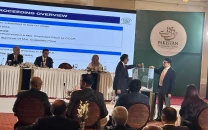



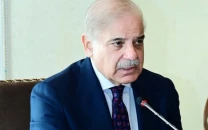

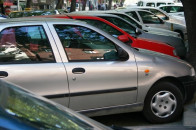

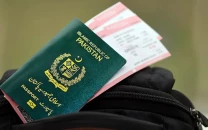








COMMENTS
Comments are moderated and generally will be posted if they are on-topic and not abusive.
For more information, please see our Comments FAQ